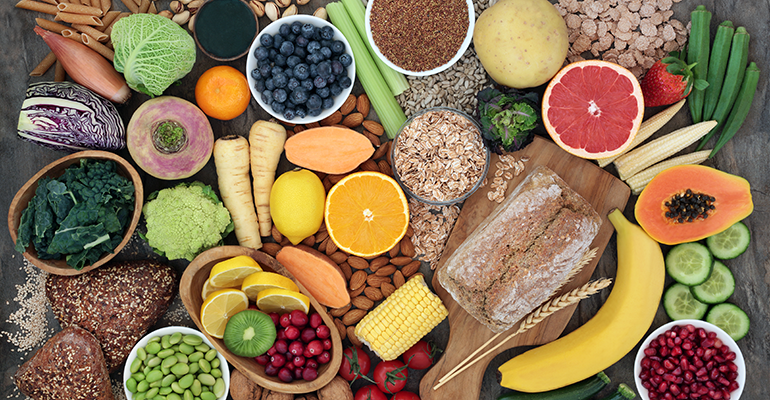News
Germany releases new nutrition guidelines
5 Apr 2024The German Society for Nutrition (DGE) publishes its latest dietary guidelines, focusing more on plant-based foods and highlighting health and sustainability.
The German Society for Nutrition (DGE) released its latest Food-Based Dietary Guidelines (FBDGs) at its 61st Scientific Congress in March 2024.

“The German FBDGs aim to summarise how a health-promoting diet can be implemented in everyday life and provide consumers with simple rules of conduct,” a spokesperson for DGE told Ingredients Network.
A committee formed by DGE consisting of scientists from nutrition science and related disciplines developed the current guidelines based on D-A-CH reference values for nutrient intake and the prevention of non-communicable diseases. “Ecological aspects, physical activity and mindful eating/enjoyment were also considered,” DGE’s spokesperson says.
In an Eat and Drink Well portal, DGE has released its new recommendations, which consist of the DGE recommendations to replace the ten rules of the DGE and the DGE nutrition circle. Highlighting the difference small changes make in consumers’ daily diets, the DGE says these represent a step towards a health-promoting and more environmentally friendly diet. The recommendations apply to healthy adults aged 18 to 65 who eat a mixed diet, including meat and fish, the DGE says.
Plant-based to play a more significant role
According to the DGE, a healthy and eco-friendly diet should consist of over 75% plant- and almost 25% animal-based foods. The DGE suggests opting for primarily plant-based foods and consuming more food groups offering various options. The guidelines also favour plant-based fats like vegetable oils over animal sources like butter.
“The now-released FBDG was derived for healthy German adults following an omnivorous diet, which is the most common diet in Germany, but it can still give orientation for all healthy adults,” says a spokesperson for DGE. The DGE adds that specific FBDG for kids or vegetarian and vegan diets will follow.
The new dietary guidance states it is possible to replace dairy products with plant-based alternatives as long as consumers receive adequate calcium, vitamin B2, and iodine intake.
Beans, legumes and nuts are now recognised as a separate food group, further emphasising plant-based foods. These foods having a separate category is a positive step, “recognising the important role that beans and legumes have to play in transforming our food system”, Haffner says in a LinkedIn post. However, noting that fungi proteins are not included in the recommendations, Haffner adds that this is “missing a trick”.
Fruit and vegetables remain the most essential food group in terms of quantity. The DGE recommends consumers eat five portions of fruit and vegetables daily. However, in its latest guidelines, it has removed additional individual portion information detailing its suggestion to eat three portions of vegetables and two portions of fruit.
Revising its food-based dietary recommendations for Germany, the FBDG recommends that consumers limit their meat intake to 300g per week and reduce dairy consumption to two servings a day, compared to the previous recommendation of three. Guidance on fish intake is recommended at one to two portions per week.
Calls for consumer and planetary health
The new guidelines focus on health and sustainability and highlight the benefits of plant-based diets for human health and the planet. “If we want to eat healthily and at the same time protect the environment, we have to change our diet now,” says Prof. Dr. Bernhard Watzl, DGE President and head of the DGE working group on food-related nutritional recommendations.
 © AdobeStock/Christian Müller
© AdobeStock/Christian Müller
The DGE says the guideline aims to explore different aspects of nutrition, such as sustainability, environmental impact, and the German eating pattern, in its FBDG as a first step towards greater health and environmental protection.
“The new German food-based dietary guidelines take into account health and sustainability, which are inextricably intertwined and two sides of the same coin,” Tanya Haffner, Dietitian and founder of MyNutriWeb, told Ingredients Network. “They reflect the current evidence for the health and planetary benefits of plant-based diets and echo other’s recent country updates,” Haffner adds.
A 2022 research study assessed and benchmarked Germany’s nutrition policies against international best practices. The findings revealed that Germany lags behind international best practices in several key policy areas and that adopting global best practices in key policy areas could help reduce the burden of nutrition-related chronic disease and related inequalities in nutrition and health in Germany.
“Since food system changes will use these as a guide, this will be one key step forward in helping to shape consumer behaviour,” Haffner says.
The new model behind dietary advice
Germany’s guidelines are based on a new mathematical optimisation model developed by DGE and other industry professionals. Expanding upon its healthy diet recommendations, the latest model considers aspects such as reducing risks for diet-related diseases, minimising harmful environmental and climate effects (greenhouse gas emissions and land use), and usual consumption habits in Germany.
“The results of the mathematical optimisation model confirm the previously valid food-related dietary recommendations of the DGE, which include predominantly plant-based foods supplemented by a lower proportion of foods of animal origin,” says the DGE spokesperson.
The industry may wonder how Germany’s updated nutrition guidelines impact manufacturers and new product developments. The spokesperson says DGE currently gives recommendations on plant-based milk alternatives. In addition, DGE plans to provide more detailed information on the recommendations, including plant-based milk alternatives and meat substitutes.
Related news

Limiting trans fats in Kenyan food products could prevent heart disease
4 Apr 2024
Implementing trans fat restrictions in Kenya could bring about significant health and economic benefits, saving lives and reducing healthcare costs, study finds.
Read more
Meal kits offer convenience, but do they deliver nutritionally?
3 Apr 2024
A study examining the vegetable content of meal kit subscription services finds significant variations in quantity per serving, presenting an opportunity for brands to enhance their offerings with more veggies.
Read more
KoRo’s limited edition pistachio-packed waffle delivers balanced indulgence
26 Mar 2024
Natural food brand KoRo’s special edition vegan waffle crafted with 45% pistachios, stands as a healthy yet indulgent snack, embracing the nutritious appeal of nuts.
Read more
‘Miffy eats the rainbow’: Tips to market fruit and vegetables to kids
25 Mar 2024
Using a playful and colourful approach with storytelling can encourage children to try new varieties of fruit and vegetables, according to an ongoing Wageningen University study called ‘Miffy eats the rainbow’.
Read more
Are brands ready for new USDA organic food rules?
21 Mar 2024
The US Department of Agriculture’s (USDA) Strengthening Organic Enforcement rule will come into force on 19 March, with the aim of protecting consumers by preventing fraud in the organic supply chain. Are organic producers and brands ready?
Read more
Ultra-processed food intake in South Africa at concerning levels, study suggests
19 Mar 2024
As South Africa considers introducing front-of-pack warning labels and strict marketing limits for unhealthy foods, research has found that low-income South Africans get around half of their calories from ultra-processed foods (UPFs) – “a cause for con...
Read more
Food ingredients drive growth in beauty supplements
15 Mar 2024
As Japanese cosmetics giant Shiseido partners with a food ingredient supplier for the launch of its “inner wellness” division, food-based extracts are playing a defining part in beauty-from-within supplement launches in Asia and beyond.
Read more
Tesco trials first ever menopause-dedicated retail space
13 Mar 2024
The growing awareness about how the menopause can affect women’s health has prompted a slew of bespoke supplement and beauty products. Tesco has become the first major retailer to trial a dedicated menopause-friendly retail space.
Read more
Brazilian manufacturers must comply with warning label regulation, says court
7 Mar 2024
The Federal Court of São Paulo has ruled that Brazilian manufacturers must comply with front-of-pack labelling regulation that requires unhealthy products to feature warning labels, scrapping a last-minute one-year extension.
Read more
Generation X consumers lean into vitamin-based products
5 Mar 2024
Aged between 44 and 60, Gen X consumers want agency over their health and wellness and are adopting a preventative approach using vitamins and supplements to promote healthy ageing.
Read more